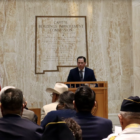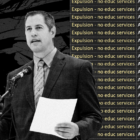Advocates of a proposed trust fund that would give New Mexico’s tribes more money and freedom to build out their own education departments have agreed to abandon efforts to get $50 million into this year’s budget in return for making a much larger ask in 2024.The bill’s sponsor, Rep. Derrick Lente, a Democrat from Sandia Pueblo, framed the decision Thursday afternoon as a strategic one.“…do we take the initial $50 million investment this year” or go for more money next year “knowing I will have a seat at the LFC table,” Lente said.
Lente, as the new chairman of the House Taxation and Revenue Committee, will join powerful lawmakers on the Legislative Finance Committee this year to shape what will become the 2024-25 state budget.
He hopes to use those months to educate and create support from other policy makers and legislators for the trust fund and the amount needed, he said. The original hope for the fund of $250 million was scaled down this year to $50 million, an amount many observers questioned as too little to generate enough money for the state’s 23 tribes.The idea for the trust fund is that tribes would use annual interest earned on the money for language revitalization efforts, resources such as internet access, and career readiness programs, among other priorities. The annual revenue stream would give tribes greater autonomy to shape their own education programs.
House Speaker Javier Martínez, D-Albuquerque, and budget committee chairman Nathan Small, D-Las Cruces, have given him assurances that the education trust fund proposal will be part of the 2024 budget discussions, Lente added.Martínez confirmed Lente’s understanding of next year’s budget process, saying lawmakers would “absolutely” talk about the education trust fund with plans to ask for much more than $50 million. “That’s been my life’s work,” Martínez said, speaking of his efforts to tackle entrenched problems created by historic neglect of the needs of underserved communities. Lente spoke of his ascension to the House’s tax committee chairmanship as part of a “paradigm shift happening in the House” this year — a shift “that is creating opportunities we’ve never had before,” Lente said.
On the first day of this year’s session Martínez was elected House speaker and chose new people to chair several House committees, including Lente and Small, who replaced the longtime chairwoman of the House budget committee.








